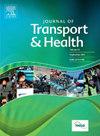Acceptability of a city-wide transport plan: A thematic analysis of written consultation responses
IF 3.2
3区 工程技术
Q2 PUBLIC, ENVIRONMENTAL & OCCUPATIONAL HEALTH
引用次数: 0
Abstract
Introduction
Policy intervention to reduce car use is required for environmental and health benefits. Multi-component interventions with both positive (i.e. ‘carrot’) and negative (i.e. ‘stick’) strategies are effective in promoting modal shift, but ‘stick’ strategies are less acceptable and often abandoned before implementation. This study aims to understand the arguments surrounding policy acceptability for a multi-component transport plan including both carrot and stick strategies in Cambridge, UK.
Methods
A series of public consultations between 2017 and 2022 informed transport priorities and provided feedback on a range of proposals. The final public consultation sought views on detailed proposals to expand the bus network and invest in sustainable travel infrastructure funded by the implementation of a road user charge. Following the consultation, concessions were made to the plans and they were later abandoned due to a lack of political consensus. We downloaded and analysed written responses generated during the consultation to identify arguments influencing policy acceptance.
Results
From 115 included responses, we identified five themes: (1) support for the overall vision of the transport strategy; (2) mixed support on proposals (favouring carrots but not sticks); (3) concerns about consultation process; (4) concerns about deliverability of proposals; and (5) the effects of the scheme on transport, inequalities and economic growth.
Conclusions
Our findings suggest that policy design and communication should focus on perceived effectiveness and equity and building trust among agencies ahead of policy proposals to support the effective implementation of travel policy solutions.
城市交通规划的可接受性:书面咨询回应的专题分析
为了环境和健康利益,需要进行政策干预以减少汽车使用。积极(即“胡萝卜”)和消极(即“大棒”)策略的多成分干预措施在促进模式转变方面是有效的,但“大棒”策略不太可接受,往往在实施之前就放弃了。本研究旨在了解围绕英国剑桥多组分运输计划的政策可接受性的争论,包括胡萝卜和大棒策略。方法在2017年至2022年期间进行了一系列公众咨询,了解了交通运输的优先事项,并就一系列建议提供了反馈。在最后的公众谘询中,政府就扩大巴士网络和投资可持续交通基础设施的详细建议征询公众意见,这些建议由道路使用者收费提供资金。在磋商之后,各方对这些计划作出了让步,但由于缺乏政治共识,这些计划后来被放弃。我们下载并分析了咨询期间产生的书面答复,以确定影响政策接受的论据。结果从115份回复中,我们确定了五个主题:(1)支持运输策略的整体愿景;(2)对提案的支持不一(喜欢胡萝卜而不是大棒);(三)对咨询过程的关注;(4)对方案可交付性的担忧;(5)该方案对交通、不平等和经济增长的影响。结论研究结果表明,政策设计和沟通应侧重于感知有效性和公平性,并在政策建议之前建立机构之间的信任,以支持旅行政策解决方案的有效实施。
本文章由计算机程序翻译,如有差异,请以英文原文为准。
求助全文
约1分钟内获得全文
求助全文

 求助内容:
求助内容: 应助结果提醒方式:
应助结果提醒方式:


